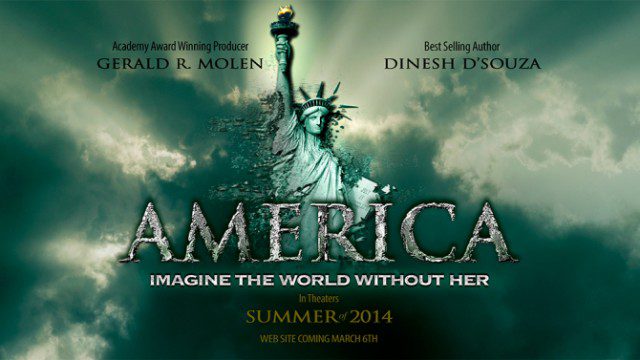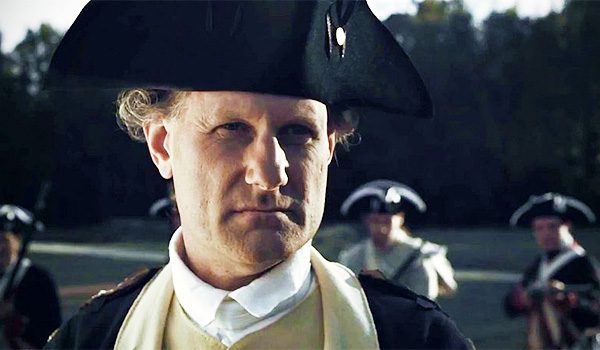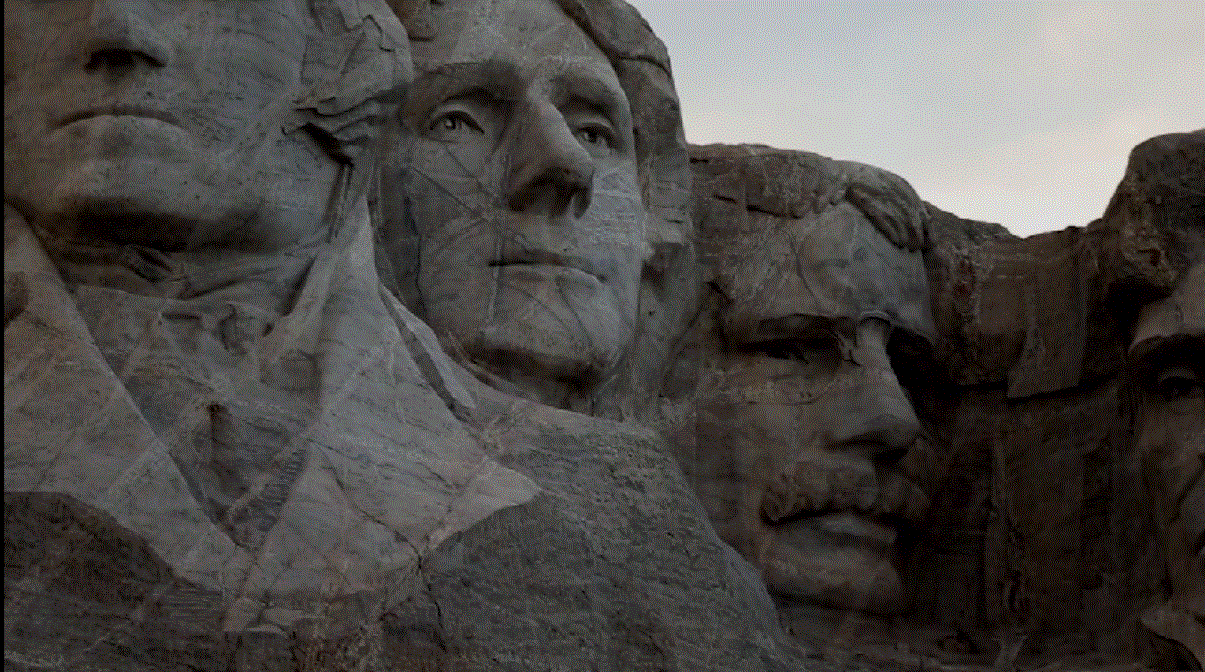America: Imagine the World Without Her – A Movie Review by N. Tensen
Dinesh D’Souza is a man on a mission. That mission is to save America from being completely altered or destroyed by threats that exist mostly within his head.
It’s what prompted him to direct 2016: Obama’s America, the opinion piece doc that did a phenomenal job of having no impact on that year’s presidential election. Based in part on the bogus thesis that the president had his political ideology shaped by a Kenyan father he hardly knew, it also became the second highest-grossing political documentary of all time. Dinesh proudly mentions that fact (and gloats about how it caught the media off guard), but leaves unsaid what political filmmaker’s work occupies the top slot (it’s, of course, Michael Moore for his darts at Dubya hit piece Fahrenheit 9/11).
Elsewhere he’s quite gleeful to take shots at the leftish director. There are some striking similarities between the two though. Both are remarkably comfortable making themselves the subject. They are diametrically opposed ideologues who take an often dubious and vastly oversimplified view of complex issues. And yet with both of them, underneath all the gloom and the intense passion for the cause, there’s a sense that they both know there’s plenty of money to be made in this racket. The crucial difference is that Moore, no matter what you think about him or his politics, is generally a competent filmmaker. D’Souza is simply not.
America: Imagine the World Without Her, his second documentary (it’s really more of a rambling polemic) is based on ones of his books. The argumentation is all over the place, but the premise of this adaptation boils down to being that America is the greatest country on earth and the values that it was erected on our under attack from within. Ours is a shining beacon of freedom and opportunity that certainly made good on its promises for a young immigrant from India like Dinesh. “America does something truly unique: it lets you choose your own script”, he says of the homeland he’s adopted. He begins his movie by taking us back to the beginning of it all with a reenactment of a Revolutionary War battle scene in which George Washington is shot through the chest and dies on the spot. D’Souza then asks some stark questions: what would the world look like if America didn’t exist? How would things be if the Civil War was lost or if Hitler got the atomic bomb before we did?
He spends a lot more time assailing the alleged falsehood propagators that undermine America than he does conjuring up a hypothetical world in its absence. The internal threats are manufactured or grossly exaggerated grievances (“The shaming of America is not an accident,” he intones). The ugly history of mass genocide against the native population or the enslavement of (mainly) black Africans is rationalized or sidestepped. He rightly points out how vast scores of natives were wiped out by European germs, but barely seems interested in acknowledging the very real violence that was carried out, not to mention how some of those viruses were spread intentionally with infected blankets in a proto-version of biological warfare. The Mexican territory was won fair and square (and naturally he sees the south-western United States as under siege from hordes of people from the other side). Slavery we learn was bad, but in a bizarre stroke of explaining it away, he argues that a couple thousand freed blacks apparently owned slaves in the Deep South (a teeny-tiny fraction of the total population). So, basically, let’s not get too mad at the white majority who profited immensely off stolen labor and the legacy of discrimination. And Howard Zinn, the late author of the (admittedly slanted) A People’s History of the United States, receives quite a bit of scorn for fostering all these resentful anti-American lies by putting them together in one handy tract.
The first half or so of America consists of him smugly resolving thorny issues with facile answers. D’Souza touts the glories of capitalism and how it lacks the force and coercion of other economic systems. He seems obtuse to the violent union busting by police and owners against workers that led to so much unrest and the Progressive Era and New Deal labor reforms (property rights too, as much as taxation, requires force). Anomalous, though obviously inspiring examples of black Americans making amazing careers for themselves in the 19th century receive ample attention. The enormous discrimination that persists to this day in housing, banking, employment opportunities, etc. strangely goes unmentioned. And on the foreign policy front, he sees America unambiguously as a force for good. His strong preference is to go after the “America is a great evil” straw-men figures on the fringe hardcore left, instead of grappling with more complex arguments about how this country has done some profound good in the world and also some tragic damage. Few things are black or white.
He then turns his ire to the usual targets for the conservative movement: the President, Hillary Clinton, and their deep-seated connection to the work and ideology of radical-community organizer Saul Alinsky. The man inspires so much trumped up boogieman fear in right-wingers you’d never know that influential Tea Partier Dick Armey has handed out copies of the late lefty’s Rules for Radicals as an instruction manual. By that point anyway the movie is just a paranoid anti-Clinton commercial preparing itself for what seems like an inevitable 2016 run by her. “Hillary figured it out”, he warns of her late 60’s radical days and time spent working with Alinsky, “Obama is now carrying it out”.
That’s one of the biggest problems with America: Imagine the World Without Her: his propensity to make utterly ludicrous claims with no second-guessing. D’Souza just takes it as a given that President Obama is an anti-capitalist, socialist anti-colonial radical and that the United States is currently veering away from a market system. The whoppers add up quickly. “Alisnky would be so proud of Obamacare,” he asserts, an utterly fraudulent claim given that left-wing radicals despise the program for keeping private insurance companies (largely) still in charge of the show. Later he insists Obama signed onto the bank bailouts just to expand federal government authority. The rescue of the financial institutions started under President Bush, of course, and Obama disappointed the genuine left by not nationalizing the firms or arresting the men who nearly brought on a global depression. The President’s economic agenda involves redistribution “on a scale we’ve never seen before”, he argues without any supporting evidence. Obama’s “you didn’t build that” comments are played out of context. In Michael Moore fashion the misleading “if you like your plan, you can keep your plan” quotes are assembled and played sneeringly on a loop.
D’Souza probably isn’t the ideal candidate to make this case. The glib discussions of slavery and race have to be played out against his tasteless and (I think) patently bigoted tweet last year calling President Obama “Grown Up Travyon” (it was quickly taken down). And for all his hysteria about the NSA and the IRS scandals and what he views to be an biased application of justice to intimidate conservative opposition, the man was arrested and prosecuted for campaign finance fraud. The best he can muster is a quick half-hearted confession: “I made a mistake.” The law breaking by him is documented; the evasive “But what about the other guys!” spin is pure conjecture. D’Souza ultimately doesn’t include mention of his fraud as anything other than an excuse for more self-aggrandizing.
As a movie experience America: Imagine the World Without Her is vapid and shoddy. The reenactments strewn throughout of the Revolutionary War, Alexis de Tocqueville’s visit to the States, and Abraham Lincoln’s meeting with Frederick Douglas and his presidential debates with Stephen Douglas, are stiff and hugely unnecessary. The graphics are clunky and bad, the music cheesy, the interviews unedifying (D’Souza even when interviewing easy targets like a truly anti-American professor can’t go through with satisfying follow-up questions). A montage of him playing the owner and all the workers at a fast food restaurant is crude, narcissistic, and comes across as rather snotty. Co-directed with John Sullivan the whole thing is truly embarrassing.
America wants to galvanize, it wants to reverse the obvious decline of the United States at home and abroad, it wants to discredit Obama and his radical left allies, and hey, if it rakes in some big bucks while doing that, that’s a sacrifice that D’Souza is willing to make. What’s on display though runs the gamut from jaw dropping to asinine and disingenuous. This is a dumbed down, messy big screen version of the same staunch conservative philosophy one could get from a far better thought out George Will column every week. If the right really does want to stand up to the liberal establishment and make the case for their values, that’s fine. A monopoly in political discourse serves no one and a smart, credible opposition is always needed. Radical idea: step one might be making movies and documentaries that have even a fraction as much aptitude as they do certitude and paranoia.





